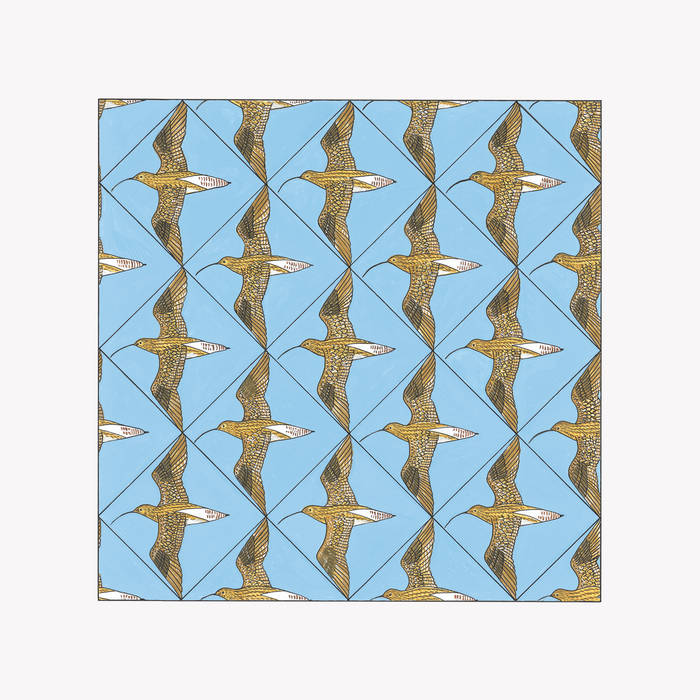The brainchild of Orkney-born musician Merlyn Driver, ‘Simmerdim: Curlew Sounds’ is a multi-artist album inspired by the Eurasian curlew. Such celebrations inspire us to protect what we have, writes Karen Lloyd.

Merlyn Driver’s Simmerdim is a celebration of the endangered Eurasian curlew, a red-listed species of conservation concern. The project attests to the fact that we cannot save what we do not love, and that the arts are key to raising awareness far and wide. Supported by the RSPB and musicians from countries to which some of our UK curlews migrate (including Norway and Finland) Simmerdim fuses an eclectic mix of Indian tabla, jazz, a cappella, British folk and more, featuring a geographically diverse array from Talvin Singh, David Gray, The Unthanks, Cosmo Sheldrake, Estonian’s Puuluup, Saami yoiker Marja Mortensson, Tuuletar, Merlyn Driver and more.
In spring curlews migrate inland from coastal mudflats to farmers’ fields and moorlands. Many of us continue to celebrate their return, but frequently now that celebration is tinged with more than a hint of concern. Since the Second World War drastic changes in agricultural practices with the radical shift from haymaking to silage production (with earlier and increased cuts of grass) has mostly done for these birds. Consider too the corncrake, a bird that was once right here amongst us, now clinging on in a minority of places in the Western Isles of Scotland. If Constable’s ‘Haywain’ had a soundtrack, both the curlew and corncrake would be there; constituents of a soundscape that until so very recently was unaltered for millennia. When a species disappears like this, it’s like lights being turned out across the land. Curlews, needless to say, are not aware of changes in farming practices, and so continue to expend valuable energy in the effort to raise a brood. Most fail to get even a single chick away.
Einojuhani Rautavaara’s 1972 composition ‘Cantus Arcticus (Concerto for Birds and Orchestra)’ incorporated field-recordings of birds in the high Arctic, amongst which are Whooper Swans and pinkfoot geese. But the first — and it is a thrilling, expansive moment — is the rising glissando of curlew. Similarly, Simmerdim’s opening track ‘Kevään Kajo’, by Helsinki-based Tuuletar, delivers an electrostatic charge of entwined human and curlew voices. Driver’s own curlew research revealed a mass of folklore, poetry and music on the species. His track ‘Simmerdim’ references the curlew legend of the Seven Whistlers;
Well I heard the curlew was a bad omen
And I’ve rarely heard a stranger thing
For there’s a path that opens through conscience
When they’re calling out, caught in the simmerdim
Emily Barker’s ‘Beuno’s Blessing’ references another legend and attests to the rich literary heritage of curlews. ‘Think Williams, Heaney, Hughes and Yeats,’ because of course, without the species itself there can be no poetry, art nor music made about it; when a species disappears, writers may only provide the poetry of retrospect. Any celebration of a species on the edge will necessarily address the nature of loss, and Tiny Leaves’ meditative closing moment, ‘Runner, Messenger’ is a dreamy lament for the endtimes.
The second CD features soundscapes recorded in 5 Curlew LIFE locations that are important for breeding curlews; Insh marshes in the Cairgorms, Gesltsdale in Northern Cumbria, Ysbyty Ifan in Wales, Lough Erne in Northern Ireland and Driver’s own home territory of Orkney. Tuning in, we also hear a host of accompanying species — cuckoo, Red grouse, wren, meadow pipit, song thrush, snipe, willow warbler, golden plover — indicative of a suite of functioning ecosystems. How well they continue to function in the future is largely down to us.
Curlews are amongst the most consummate musicians of the avian world; field recordings reveal an astonishing 18 separate calls, and no doubt there are even more. Simmerdim helps us to understand that curlew are one of our the most iconic birds, and a keystone species in our collective cultural memory. It is pleasing to know then, that a number of projects across the UK are working hard to restore local populations of curlews, including the pioneering work of Curlew Country in Shropshire, Curlew Action, Wildfowl and Wetlands Trust, RSPB, the British Trust for Ornithology and more.
Without curlews, Driver writes, ‘we would suffer much more than a loss of biodiversity. Their absence, and the absence of their sounds, would cut off pathways for imagination, conscience and feelings.’ This is the philosophical entreaty of our age; to keep this and countless other species in mind, lest we forget. Simmerdim attests to the ways in which celebration and communication are forces that may yet allow us to keep the world around us at least semi-wild. Like the call of the curlew itself, this music connects, transports, mourns and above all, invites us to celebrate what we have, that it might — no; because we need it to — survive.
*
‘Simmerdim’ is out now and available here, with 100% of net profits from sales going to the RSPB.
Karen Lloyd is the award-winning author of ‘The Gathering Tide’, ‘The Blackbird Diaries’ and ‘Abundance: Nature in Recovery’. Follow her on Twitter here.